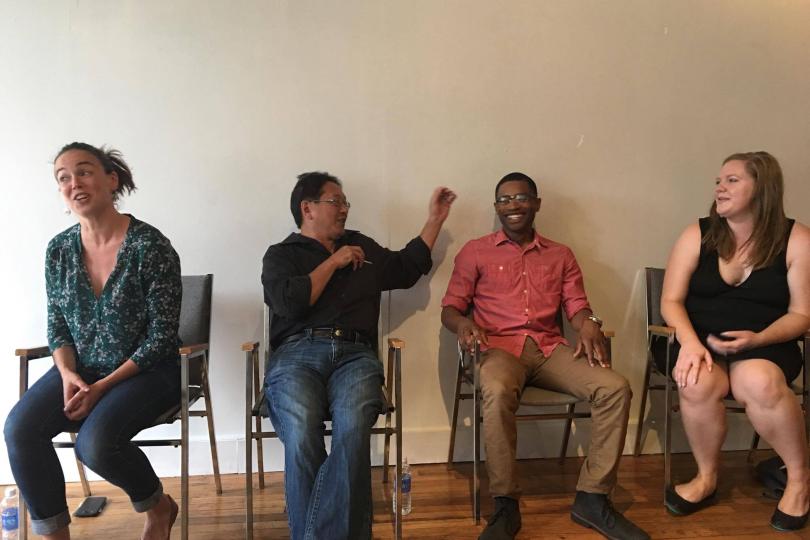The World We Live In

The storefront Sandbox Theatre is a spare space with white walls, worn wooden floors, and a collection of chairs. This is where the Sandbox ensemble normally devises new work. But on Sunday night, they and the Twin Cities Theatre Bloggers opened their doors to theatremakers, artists, writers, and theatre-lovers for a conversation on diversity, inclusion, and representation in Twin Cities theatre.
Continuing the Conversation, as the new monthly series is called, is all about gathering together in one space to discuss pressing issues for the Twin Cities theatre community. Unsurprisingly, many of these issues tentacle out into other areas of life: whose stories are told and why? What can we do to sincerely gather diverse groups of people to make art? How do we support and further the work of artists who are telling and uplifting diverse and inclusive stories?
Becki Iverson, a member of the Twin Cities Theatre Bloggers, was the evening’s moderator, asking questions of panelists Isabel Nelson, Kory LaQuess Pullam, and Rick Shiomi. Nelson and her company Transatlantic Love Affair are all about devising new work. Pullam, the founder of Blackout Improv founding artistic director of Underdog Theatre, also devises and has performed on stages across the Twin Cities since moving here about four years ago. Shiomi is perhaps best known for founding Mu Performing Arts over 20 years ago. In 2013, he co-founded another theatre company, Full Circle Theater Company, with four other mainstays of the local theatre scene.
The conversation was wide-ranging and animated, with attendees joining in to ask their own questions and offer comments. The highlights of the evening follow.
“There’s a desire in decision-makers” to increase diversity, said Rick Shiomi. “They see the train going, but they can’t grab on.” Kory Pullam recommended those decision-makers examine leadership and the material chosen for production. “Ask yourself: what story are you telling? Why are you telling it? Who is involved at every level of that storytelling?”
Pullam then described a recent audition notice he’d read that ran through all the available roles and ended with: “POCs are encouraged to audition.” That curt line put him off. “There’s a laziness there,” he said. “There has to be more effort.” He said if theatres are really serious about reaching beyond their typical stable of actors, they should put out feelers into particular communities. They should examine what other effort has been made, if any, to invite people in.
Nelson is in the midst of that examination process. “We’re still figuring it out,” she said. “We’re very aware of our gaps in inclusion and representation.” Nelson founded her company Transatlantic Love Affair almost by accident in 2010 when her Fringe show was selected. She called on former collaborators and other theatre friends--most of whom were white--to put on that show. They kept working together afterward, but it became apparent to Nelson that they were failing to put on diverse stories. “You can have a diverse cast, but if you’re still centering white stories, that’s a problem.” One of her solutions? Workshop-auditions that are free and open to anyone who wants to stop by, learn how Transatlantic Love Affair devises work, share skills, and meet people.
--
“I see [tokenism] happen so often,” said Pullam. “Even if [theatres] don’t mean it, it comes off that way.” Pullam said there are some companies he’s never auditioned for and likely never will based on the fact that he doesn’t find their work interesting or inclusive. The panelists discussed the need for theatremakers to examine roles written for people of color. How are they described? How do they talk? What do they do? How does their portrayal challenge the audience’s perception or the dominant narrative of society about that group of people? Shiomi added, “Artistic power is important. Who has it?”
Nelson added, “There’s a deserved cynicism from communities of color about why theatremakers want people of color.” It can’t simply be about having non-white bodies onstage, she added. You have to “honor the artistry” of everyone in the room, Nelson said. “It makes the art better.”
--
Live theatre competes with so many other forms of entertainment that it must differentiate itself while also welcoming people of all ages and backgrounds. “So much of theatre culture must shift,” said Pullam. The “rules of theatregoing” often discourage potential theatregoers, he continued: there’s the cost, the dress code, the expectation that audiences will sit in silence for a few hours. “We’re not there anymore,” he said.
Several attendees chimed in, complimenting the work of 10,000 Things for not only bringing theatre directly to people but inviting audience reactions and interaction during performances. Someone else added that audiences should be invited into the creation process, perhaps to the workshops that Nelson held for Transatlantic Love Affair. Nelson said the theatre community has a prime opportunity to not only diversify their work, casts, and audiences but to reach the traditional 55+, white audiences currently attending theatre most.
--
At one point in the evening, Nelson described a piece her company had devised, watching the opening for the first time, and seeing a 60-year-old man standing next to a 30-something black woman next to other diverse actors. “That’s the world I live in!” she thought.
It’s the world we all live in, and Continuing the Conversation wants to make sure Twin Cities stages reflect that.
The next event in the series is on Monday, August 28, 2017, again at Sandbox Theatre. You can follow and contribute to the conversation online with #TCTBConvo. Suggested topics for future conversations are welcome.




